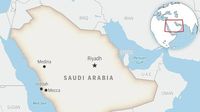On the evening of July 30, 2025, a terrifying incident unfolded at an amusement park in the Al-Hada district of Taif, a mountain resort city in western Saudi Arabia. The "360 Big Pendulum" ride, a popular attraction known for its sweeping arcs, suddenly snapped in two while in operation, sending the section carrying passengers crashing to the ground from several meters high. The collapse left 23 people injured, including several in critical condition, and sparked immediate emergency response and a full-scale investigation ordered by local authorities.
Video footage of the accident, widely circulated on social media, captured the harrowing moment the pendulum swung riders strapped securely in their seats through wide arcs before the ride’s central arm catastrophically failed. The passenger section then plummeted, triggering screams and panic among visitors and bystanders. Witnesses described chaotic scenes, with people hanging from the platform and emergency services rushing to the scene.
The Taif governor, Prince Saud bin Nahar bin Saud bin Abdulaziz, quickly responded to the crisis by ordering the immediate closure of the amusement park and launching an investigation into the cause of the collapse. In a statement, the regional government confirmed that some injured individuals received first aid on-site, while others were transported to nearby hospitals for further treatment. Although the precise number hospitalized was not specified, local media reported three women in critical condition and four others seriously injured. Thankfully, no fatalities were reported.
Emergency teams, including Saudi civil defence units and paramedics from the Red Crescent, arrived promptly to provide medical assistance and transport the injured. The most severely hurt victims were admitted to intensive care units, underscoring the gravity of the accident. The site of the collapse remained cordoned off as authorities from the municipality, the General Entertainment Authority, and security agencies conducted a thorough investigation into whether the amusement park complied with safety and technical standards.
The incident has ignited widespread concern across Saudi social media platforms, with users sharing the distressing videos and calling for stricter enforcement of safety regulations in amusement parks nationwide. This outcry comes amid Saudi Arabia’s ambitious giga-projects, such as Qiddiya near Riyadh, which aim to develop world-class entertainment complexes, including theme parks and motorsports arenas. The safety of such ventures is now under intense scrutiny.
The "360 Big Pendulum" ride was a key attraction in the Al-Hada area, a popular destination for both locals and tourists seeking mountain resort experiences. The ride’s sudden structural failure, snapping horizontally in its central column, raised immediate questions about maintenance, inspection protocols, and overall safety standards. Officials have not yet released preliminary findings, but the investigation is expected to shed light on the causes and whether negligence or technical faults were involved.
Local media outlets such as Arab News and Gulf News reported the extent of injuries and the swift response by emergency services. Arab News cited emergency teams confirming varying degrees of injuries among the victims, with three people critically ill. Gulf News highlighted that while some injured were treated at the scene, others required hospital care, reflecting the diverse severity of the injuries sustained.
The regional government’s statement emphasized the seriousness with which the authorities are treating the incident. Prince Saud bin Nahar bin Saud bin Abdulaziz’s directive to close the park and conduct a thorough investigation reflects a commitment to public safety and accountability. The closure remains in effect as officials continue their inquiries.
Social media users expressed shock and empathy for the victims, with many demanding reforms to prevent similar accidents in the future. The incident starkly highlights the risks associated with amusement park rides when safety measures fail or are insufficient. It also serves as a critical reminder for regulatory bodies to ensure that entertainment facilities meet rigorous safety standards, especially as Saudi Arabia invests heavily in expanding its leisure and tourism sectors.
As the investigation unfolds, authorities are expected to release detailed reports outlining the technical causes of the collapse and any lapses in safety protocols. The findings will likely influence future regulations and oversight of amusement parks across the kingdom, aiming to restore public confidence and prevent such tragedies.
For now, the people of Taif and visitors to the Al-Hada district are left grappling with the aftermath of a frightening accident that could have been far worse. The resilience of the injured and the swift actions of emergency responders have mitigated the disaster’s toll, but the incident remains a sobering episode in Saudi Arabia’s rapidly evolving entertainment landscape.


